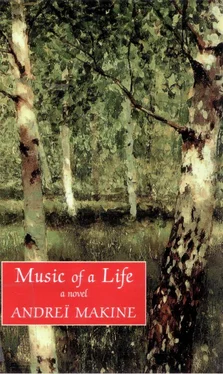Strangely enough, despite the fever that shook him, Alexe'i sank rapidly into a brief, deep sleep. He wanted to hide himself in it, hoping to wake up on the other side of the ticket window behind which that young woman had been sucking a candy. He had a dream in which the window was located very low, almost on the ground. This basement window had taken the place of the ticket woman's, and you had to stoop to catch sight of the face at it: Lera's face. But an ambiguous Lera, revealed in an unmentionable activity. The old chess player was there too, seated on a rain-soaked bench. Alexe'i was playing with him, setting down the pieces not on a chessboard but on the pages of an anatomical atlas, in which the pictures were obscurely connected with their game. And his sleep was permeated by a fear of not grasping these connections, though they were obvious to the old man. Finally there was the figure of his mother, reciting lines of verse and suddenly singing them in a voice so shrill and desperate that he awoke with a stifled cry in his throat.
He looked at his watch: half past three. Outside the window the night was beginning to grow pale. Alexe'i studied the room, the outlines of the furniture, and thought, almost calmly, But of course! He's going to turn me in! In a flash, all the strange elements he had ignored the evening before coalesced into an inescapable logic. The professor, who never went to bed late, had opened the door at the first ring, fully dressed. His wife, without whom he could not go anywhere, was absent. So was Lera. In the bedroom, it was as if everything had been ready to receive a guest… No, he won't turn me in, he'll simply open the door to them…
He jumped out of bed, threw on his clothes, fastened the catch on the door, climbed out through the window…
At the start of the path he and Lera generally took to go and bathe in a pool, he hesitated, turned toward an old shed behind the house, sat down on a chopping block, and decided to wait. He did not have to wait long. From the far end of the main street that divided this cluster of dachas in two came the sound of an engine. The car stopped. In the still nocturnal silence he heard the sound of banging at the door, the whispering of men's voices, and more distinctly, in imploring tones, but striving to preserve his dignity, the professor's voice: "Comrades, you promised me… He's a delicate young man. I beg you! I'm sure his parents – " Someone cut him off in an irritated tone: "Listen, Professor, don't stick your nose in something that doesn't concern you! You'll get your chance to speak when you're being interrogated."
Hurling himself along the path, Alexe'i heard the hammering coming from inside the house.
Much later, when he was well versed in the pitiless mania life has for playing at paradoxes, he would come to realize that in reality he owed his survival to the Germans. Ever since the month of April in this year of 1941, and even earlier, but more confusedly, people in Moscow had been talking about the impending threat from the West. On such occasions his mother's thoughts turned to her sister's family, who lived in a remote village in the Ukraine – poor relations, so to speak, and never invited to Moscow. They pictured them in their hamlet very close to the Polish border, exposed to the increasingly predictable war. "But come, now," his father would interrupt her, "our army will never let the Germans cross the frontier. And even supposing by some remote chance they manage to drop a few bombs, there'd be nothing to fear. I simply take the car, drive to your sister's, and quick as a wink, I bring them back to Moscow." This scheme for an evacuation by car would come up again from time to time in their family evenings together.
Alexe'i recollected it now when he reached the suburbs of Moscow on foot at about six in the morning. His head buzzed with the names of fellow students at the conservatory who might come to his aid, names that, reviewed one by one, faded into uncertainty. Then he thought about this aunt in the Ukraine, remembered the plan for a journey by car, and eagerly seized on the idea before it came to seem too far-fetched.
The garage, some streets away from their apartment building, was squeezed up against the wall of a demolished monastery. At this time of day the place was still deserted, the doors to the other garages closed. He stood up on tiptoe, holding his breath, as if catching a butterfly, and reached out with his hand toward a little cavity beneath the corrugated tin of the roof. His father, being absentminded, often left the duplicate key there. His fingers fumbled feverishly in the depths of the hiding place and suddenly touched metal.
He put two cans of gasoline, kept in reserve, into the trunk, and before getting in behind the wheel, he looked around. His mind, drained by weariness and fear, came to life: the garage, with a dull lightbulb in the ceiling, the smell of gasoline, these objects his father had touched – the last glimpse of their old life?
Footsteps crunched on the gravel. Alexei slipped in behind the wheel, his mind a blank once more, his heart in his mouth, his body ready to go through the familiar motions and propel the heavy black car against the half-open door… But the sounds outside resolved themselves into an unthreatening sequence: the clink of a bunch of keys, the creaking of hinges, departure.
Stopping at a crossroads, he realized that he had only once had occasion to drive outside Moscow: to take Lera to the dacha in Bor.
In the car he found a bunch of road maps, including one of the region in the Ukraine where his aunt lived. There was a jacket and an old cap lying on the back seat. He put them on and later noticed how much this garb facilitated his passage at militia checkpoints. Thanks, in particular, to the cap, he looked like a chauffeur in a hurry to reach the home of a high-ranking person. And the farther he got from Moscow, the more the appearance of the big black car commanded respect.
At the end of the second day of his journey, on what was already a country lane, he met an old farm cart being driven by a young peasant who stared open-mouthed at this car appearing in the midst of all these fields. With a strong nasal accent, in a mixture of Russian and Ukrainian, he gave him directions. Alexeï was a dozen miles from his destination.
Before night fell, he drove on farther, then turned off, following a dirt road that plunged into the forest, and stopped when a thick tree trunk barred his way. He ate a whole loaf, bought in a small town he had passed through at noon, felt intoxicated by the food and by the onset of sleep. On all sides the forest seemed endless. He wanted to look at the time, remind himself of the date, as if to have a buoy to cling to amid the ocean of branches and shadows. Lying down on the back seat, he held up his arm to the light filtering through the leaves. It was only half past eight in the evening, May 24.
"My concert!" he breathed, sitting up suddenly. A beautiful moth was fluttering against the rear window, its wings covered in fine, mysterious calligraphy, leaving traces of pollen on the glass. And it was thus, as if through the thickness of the glass, that he pictured the hall, the lights on the stage, a young man walking toward the piano. For a moment, in a poignant fantasy, he watched the continuation of that life somewhere without him.
In the morning he left the forest on foot. And looked back several times: the sun, still low, filled the interior of the abandoned car with a golden light. It looked as if it had been left there by a family who had spread out among the trees to gather wild strawberries.
His aunt listened to him in silence, let him talk for a long time, repeating himself. She sensed that this was how he would get used to his new life. His uncle returned from the town about noon and was equally taciturn. Weeks later, Alexe'i would guess that behind this silent acceptance of his coming, and the danger of his coming, there doubtless lay an unspoken desire to make him understand: Now look, we're plain country folk. We welcome you with open arms. We don't have grudges against our own kin, even though they forgot all about us. But at the time all he needed was to be able to tell them his story, to win approval, to have confirmed to him that, in any event, even if he had stayed in Moscow, he could not have done anything for his parents. He also realized that, in a few swift moves, they were already preparing for his clandestine existence in that house. Their economy with words and actions reminded him that the epidemic of fear his own family had known in 1937 had made its assault on these people much earlier, at the end of the 1920s, from the time when collectivization began in that part of the world. They had lost their two children in the famine that followed it, and had hidden fugitives before.
Читать дальше












